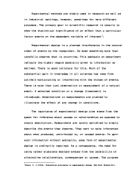Internal Validity is the approximate truth about inferences regarding cause-effect or causal relationships. Thus, internal validity is only relevant in studies that try to establish a causal relationship. It's not relevant in most observational or descriptive studies, for instance. But for studies that assess the effects of social programs or interventions, internal validity is perhaps the primary consideration. In those contexts, you would like to be able to conclude that your program or treatment made a difference -- it improved test scores or reduced symptom logy. But there may be lots of reasons, other than your program, why test scores may improve or symptoms may reduce.
External validity concerns making generalizations about your results. That is, how well do the conclusions of your study apply to other people in other places at other times? Generally speaking, social science researchers are interested in acquiring knowledge about a sizeable population. And yet, often it is not feasible to obtain information from every individual in that population. Hence, researchers draw samples from the larger population, administer the measurement instrument to this smaller sample group and generalize the results back to the entire population of interest.
External validity concerns making generalizations about your results. That is, how well do the conclusions of your study apply to other people in other places at other times? Generally speaking, social science researchers are interested in acquiring knowledge about a sizeable population. And yet, often it is not feasible to obtain information from every individual in that population. Hence, researchers draw samples from the larger population, administer the measurement instrument to this smaller sample group and generalize the results back to the entire population of interest.







